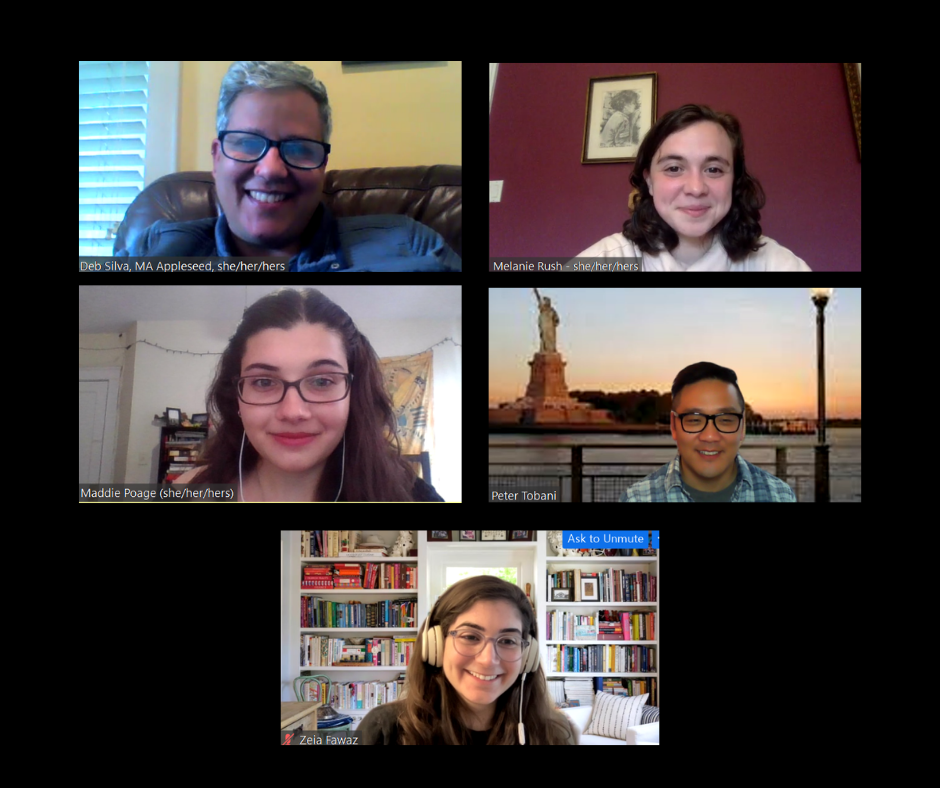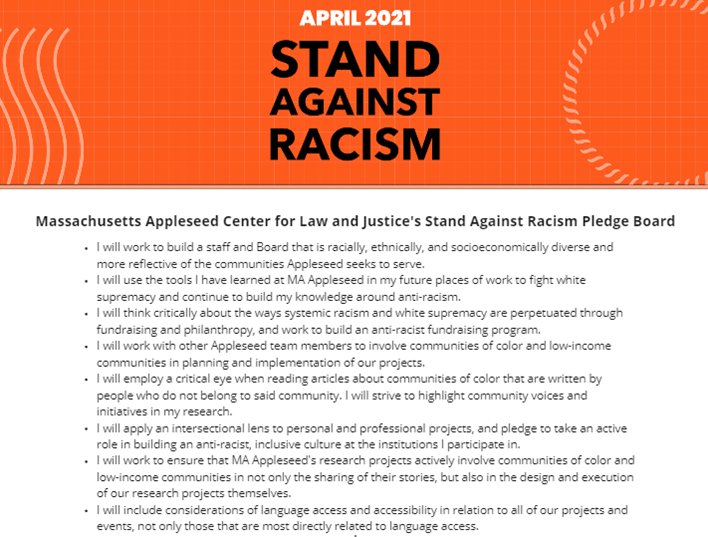This spring, Massachusetts Appleseed joined over 250 companies, schools, community organizations, and others as participants in the 2021 Stand Against Racism Campaign, hosted by the Alliance of YWCAs of Massachusetts. Through three discussion sessions during April and into early May, Massachusetts Appleseed staff and Board members gathered together to discuss and reflect on the ways in which white supremacy is embedded in our education systems, experiences in employment, and every facet of our lives.

Participants from three separate discussion sessions: Deborah Silva (Executive Director), Melanie Rush (Research and Policy Assistant), Madeline Poage (Development and Communications Associate), Peter Tobani (Board Member), Zeia Fawaz (Spring Research Intern). Not pictured: Melanie Todman (Chair of the Board of Directors) and John Shutkin (Vice Chair of the Board of Directors).
Together, staff and Board members discussed, “The Muddled History of Anti-Asian Violence” by Hua Hsu, “Racism Is Not a Historical Footnote” by the legendary Bill Russell, “Rotundamente Negra (Rotundly Black)” by Shirley Campbell, and Kimberlé Crenshaw’s keynote address at the 2016 Women of the World festival.
A number of themes emerged throughout our conversations, with participants reflecting on the failure of the American education system to adequately educate students about systemic racism, the consequences of this failure, the impact of microaggressions, the importance of engaging directly with all perspectives, and more.
Our final discussion centered predominantly on Kimberlé Crenshaw’s keynote address, which resonated with staff particularly strongly. In it, Dr. Crenshaw describes the origin of the #SayHerName campaign and lists some of the many Black women killed through racist police violence – Eleanor Bumpurs, Margaret Mitchell, Michelle Cusseaux, Tanisha Anderson, Natasha McKenna – and how the women in these examples were being evicted, experiencing homelessness, in need of mental health services, or vulnerable in other ways. But rather than being treated with understanding or support, they were met with brutality, violence, and silence. At its most fundamental, Dr. Crenshaw’s address reminds us that racism, misogyny, homophobia, transphobia, and poverty are intertwined, and until we treat them as such, they will continue to persist.
Massachusetts Appleseed staff also utilized the digital pledge board provided by YW Boston during the campaign, committing to specific ways we will each participate in the fight to eliminate racism in our work and in our lives. Through these pledges, staff members aim to strengthen our ongoing work to develop projects through the lens of anti-racism and ensure all components that make up Massachusetts Appleseed – from governance, to programs, to fundraising – align with our Statement of Values. The Statement of Values was created collaboratively by staff and the Board of Directors in 2020 and through it, we are explicit in affirming that our commitment to promoting access to justice and opportunity goes hand in hand with our commitment to combating all forms of systemic racism.

Massachusetts Appleseed’s digital pledge board, completed during the 2021 Stand Against Racism Campaign.
Massachusetts Appleseed has recently deepened its decade-long work to dismantle the school-to-prison pipeline by focusing on the specific ways girls of color are targeted and excluded from their learning environments. As we convene students, educators, advocates, and other community members together to inform and guide our research and advocacy efforts, the tools provided through this campaign will help us build an anti-racist, intersectional foundation on which to do so.
We are so grateful to YW Boston and the Alliance of YWCAs of Massachusetts for providing these resources, and to all the guest curators for their selections and discussion guides. We look forward to continuing to make space for these collaborative and essential conversations, hold ourselves accountable, and center anti-racism in our work to build a more just, inclusive future.
Recommendations for further reading and watching from Massachusetts Appleseed staff and Board members:
Want to stay informed on the latest issues Massachusetts Appleseed is working on?
Sign up for our mailing list.









